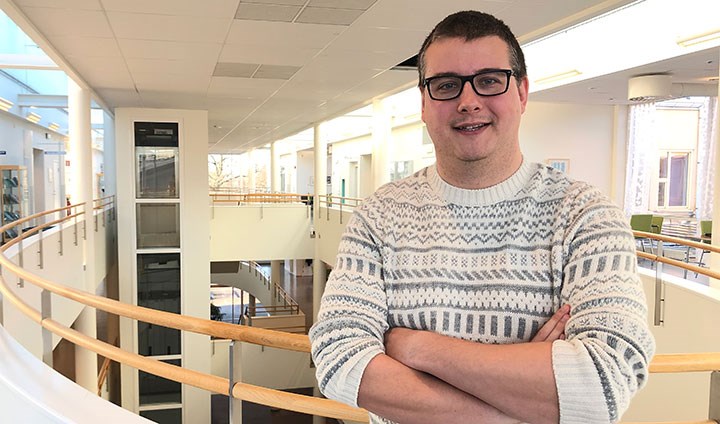“We are going to have to make sacrifices”

Political scientist Adam Standring has come to Örebro to work together with researchers in environmental sociology.
“For 30 years we were told that climate change is a scientific fact for which there is a purely scientific solution. But the realistic solution is going to require huge social and economic upheavals. We are going to have to make sacrifices”, says Örebro researcher Adam Standring. He wants to contribute with research that takes a holistic approach, making it easier to find solutions.
“Obscuring sacrifices or not fully acknowledging them, which has happened for many years, gives opponents an opportunity to question the science. It’s often been the climate change deniers who were more open about the political implications.”
“It’s only really now that the other side are starting to make those arguments – that it’s not enough to make technical adjustments”, says Adam Standring, researcher in environmental sociology at Örebro University.
Born in the UK, Adam Standring obtained his PhD in Portugal and moved to Örebro last autumn. His thesis discussed drug policy and how policy, science and politics interact. He is now intending to use the same approach to examine the climate issue.
Convince countries to act
There are several similarities – within both fields, there are large international organisations lacking the power to force a change. Instead, they have to change the way we view the problem in order to convince individual countries to act. When it comes to the climate issue, the IPCC, the UN’s Intergovernmental Panel on Climate Change, is in the driver’s seat.
“When the IPCC was created, the understanding of expertise was very much hard science. The view was that we need to get the data right and from this, somehow, we will arrive at policy solutions.”
“The IPCC was important for associating climate change with carbon emissions. That was their big thing in the 1990’s. But today, a wider approach is required, bringing in a variety of approaches and expertise,” says Adam Standring.
Rise in temperature
At the climate summit in Paris 2015, the IPCC was commissioned to issue a report of the consequences of a rise in temperature of 2 and 1.5 degrees respectively. Already in 2018, the panel had compiled 6,000 scientific articles, all pointing to a big difference between global warming of 1.5 degrees compared to 2 degrees.
“One of the interesting things with this report was that it started to connect climate change with a lot of other problems such as sustainable development in terms of how countries have different abilities to adapt.”
This is a global problem with immense consequences for different countries, not least politically. And people react differently – some deny climate change, others are affected by eco-anxiety. Turning what science says into action is not easy.
To understand climate change
“That’s why social sciences research play such an important role – to understand climate change but also to provide some of the solutions.”
He hopes that this research will play a part in showing how everything is connected. He says we must not underestimate people and oversimplify matters. Instead, researchers and the media must get better at connecting the dots between different events.
“A classic example is Brazil and the deforestation of rainforests to make way for agriculture and grazing cattle. It covers a range of issues, from the policies of Bolsonaro to dengue fever. But these issues are rarely connected,” says Adam Standring.
Machinery leave deep tracks
Forests are important for the climate since they store carbon dioxide. At the same time, machinery that clears them leave deep tracks in the forest that fill with water, enabling mosquitoes to breed and transmit the Zika virus, malaria and dengue fever. Adding to this are issues relating to crime and disadvantaged groups. It’s complex.
Are you positive about the future?
“I think you’ve got to be,” concludes Adam Standring.
Text and photo: Linda Harradine
Translation: Charlotta Hambre-Knight
